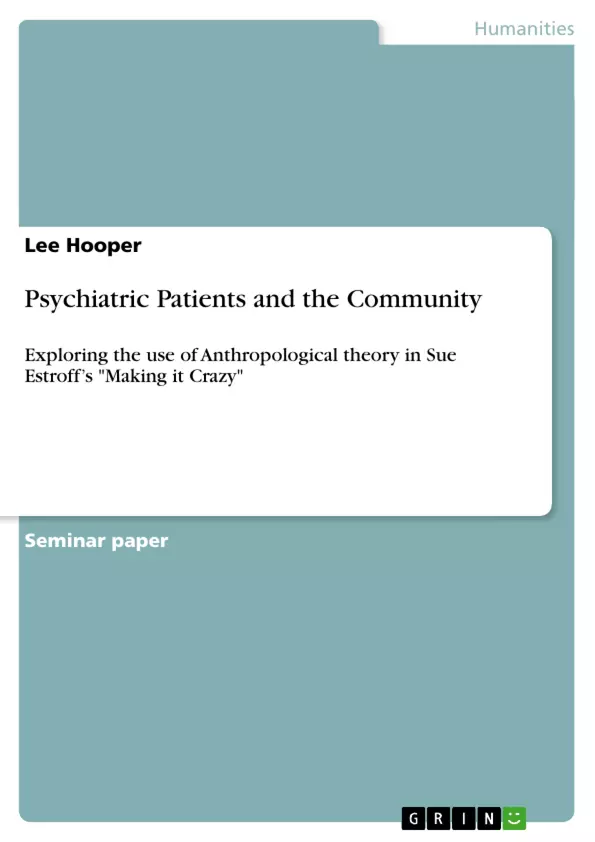In an age where psychiatric disorders are an increasing problem at both local and global levels, the need for qualitative ethnographic work by anthropologists is becoming more and more critical in understanding the issues surrounding diagnosis and treatment of mental health issues (Schlaepfer & Nemeroff, 2012, p. 1). By examining Estroff’s (1981) Making it Crazy, a review will be presented that analyses Estroff’s theoretical stance and how its application is both useful and a hindrance in understanding the complexities of psychiatric disorders. While Estroff incorporates interpretative anthropology, structural-functionalism, and various other anthropological, sociological, and psychological methods in her case study, her main theoretical stance that will be examined is an interpretative anthropological one. Through first providing a brief outline of Estroff’s ethnography and a definition of interpretative anthropology, the way she explores her subject through various interpretive methods will be demonstrated with an analysis of its strengths and weaknesses. By applying an interpretive framework, Estroff is able to gain an in-depth understanding of the complexities of patient life. However if other anthropological theories had been integrated into the analysis a more holistic interpretation and conclusion would have been reached.
Inhaltsverzeichnis (Table of Contents)
- Psychiatric Patients and the Community: Exploring the use of Anthropological theory in Sue Estroff's Making it Crazy
- Introduction
- Interpretative Anthropology
- Making it Crazy
- Cultural Relativism
- Networks of Significance
- Game and Text Analogy
- Conclusion
Zielsetzung und Themenschwerpunkte (Objectives and Key Themes)
The purpose of this essay is to critically examine the application of interpretative anthropology in Sue Estroff's ethnographic study, Making it Crazy, which explores the lives of deinstitutionalized psychiatric patients in Madison, Wisconsin. The essay analyzes how Estroff's theoretical approach both aids and hinders understanding of the complexities surrounding psychiatric disorders and patient experiences.
- The use of interpretative anthropology in understanding psychiatric patients' experiences
- The challenges of applying cultural relativism in psychiatric settings
- The influence of social networks and power dynamics on patient lives
- The impact of deinstitutionalization on the lives of psychiatric patients
- The limitations of interpretative anthropology in providing a holistic understanding of mental illness
Zusammenfassung der Kapitel (Chapter Summaries)
The essay begins by outlining the increasing need for anthropological research to understand the complexities of mental health issues, particularly in the context of deinstitutionalization. It then introduces interpretative anthropology as a theoretical framework that emphasizes cultural relativism and the interpretation of meanings within a given culture. This section highlights the importance of understanding cultural practices and symbols from the perspective of the "native" to gain a deeper understanding of their behavior.
The essay then focuses on Estroff's Making it Crazy, highlighting the specific context of deinstitutionalized patients in Madison, Wisconsin. It discusses the Program of Assertive Community Treatment (PACT) and its impact on patients' lives, emphasizing how Estroff's ethnographic approach sought to understand patients' experiences from their own perspective.
Estroff's application of cultural relativism is explored, emphasizing her efforts to understand patients' experiences without imposing her own cultural biases. The essay also examines the different networks of significance in patients' lives, including the relationships between patients, PACT staff, and the wider community. It analyzes how these networks shape patients' choices and their experiences of power dynamics.
Finally, the essay examines the limitations of relying solely on interpretative anthropology to understand psychiatric disorders. It suggests that incorporating other anthropological theories might provide a more comprehensive and holistic understanding of the complex issues surrounding mental illness.
Schlüsselwörter (Keywords)
Key concepts explored in this essay include interpretative anthropology, cultural relativism, deinstitutionalization, psychiatric disorders, ethnographic research, social networks, power dynamics, and the Program of Assertive Community Treatment (PACT). The essay examines the strengths and limitations of using interpretative anthropology to analyze and understand the lived experiences of psychiatric patients in a specific community context.
What is the focus of Sue Estroff's "Making it Crazy"?
The ethnography explores the lives of deinstitutionalized psychiatric patients in Madison, Wisconsin, and their integration into the community.
How is Interpretative Anthropology applied in this study?
Estroff uses it to understand patients' experiences from their own perspective, focusing on cultural meanings and symbols within their environment.
What is the Program of Assertive Community Treatment (PACT)?
PACT is a community-based treatment model discussed in the study that influences the daily lives and social networks of psychiatric patients.
What are the limitations of Estroff's theoretical approach?
While interpretative methods provide depth, the essay argues that a more holistic view incorporating other anthropological theories would have been more comprehensive.
How does deinstitutionalization affect patient life?
Deinstitutionalization shifts the focus from hospital care to community life, creating complex dynamics between patients, staff, and the wider public.



